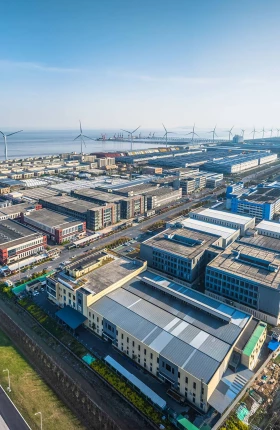Transitioning to green energy creates a healthier planet while providing countries with job growth and greater energy security. However, governments will have to make many policy tradeoffs.
Featured Insights
Sustainability Policy and Regulation

Article
February 19, 2025

Article
February 25, 2025
Although the energy transition will continue worldwide, the past year’s election results around the globe have prompted many government leaders to devote more attention to energy affordability and energy security.

Article
April 21, 2025
To thrive in uncertain times, packaging companies must remain flexible while investing in capabilities that will define future industry leadership.

Article
March 27, 2025
New fuels can decarbonize the commercial aviation industry, but stakeholders will need to move faster to achieve 2030 targets.

Six actionable opportunities for EU policymakers to accelerate the transition to regenerative agriculture at scale.

Article
January 23, 2025
To seize the economic opportunity presented by the global green transition, policymakers need to concentrate on the following principal levers and key success factors.

Article
November 19, 2024
By taking a strategic approach to ESG reporting—focusing only on materially relevant aspects—boards can meet regulatory requirements and concentrate attention on critical sustainability goals.
Highlights from UNGA & NY Climate Week
Video
October 3, 2025
How Shared Risk Can Power Climate Solutions
A blended funding strategy broadens investment risk to mobilize capital for climate adaptation and resilience, say Lightsmith’s Jay Koh and BCG’s Dave Sivaprasad.
Video
September 30, 2025
In Scaling Climate Businesses, Partnerships Are Key
After years of innovation in climate technologies, Carbon Clean’s Aniruddha Sharma and BCG’s Alex Dewar say significant scaling is next—and that will require partnerships.
Video
September 25, 2025
Helping Companies Tackle Plastic Waste
Companies can drive business outcomes—meeting the needs of supply chains, marketing teams, and customers—while reducing plastic usage, says Sebastian DiGrande of PCX Markets.
Video
September 25, 2025
The Missing Logistics Link in Sustainability
Joerg Wiese of the Kuehne Climate Center highlights why leaders must frame climate action as a business opportunity and build coalitions to scale their efforts.
Monthly Newsletter Subscription
The Sustainable Advantage: Build lasting impact through sustainability
Climate Innovation and Tech
Video
November 4, 2025
Mobilizing Private Equity is Key to Closing the Climate Finance Gap
Wendy Woods and Carbon Equity’s Saskia Bruysten explore how democratizing investment in private markets can funnel investment into much needed climate tech and innovation.
Video
October 29, 2025
Reinventing Products for Profit, Performance, and Planet Through Design to Sustainable
Value
Alejandro Navarro shows how BCG’s Design to Sustainable Value can help companies cut costs, boost margins, and reduce emissions, turning disruption into opportunity.

Article
June 11, 2025
A second major survey and report by GCMD and BCG closely tracks the shipping industry’s progress toward net zero. This extract outlines the new report’s key findings.

Article
May 6, 2025
Forests can anchor a high-integrity voluntary carbon market—if developers, landowners, and market leaders shift from transactional credit models to long-term asset stewardship.

Article
June 17, 2025
Companies that combine smart investment with targeted innovation in their value chains can achieve competitive advantage.
Video
The Key to Sustainable Growth is Deep Innovation
Lauren Taylor offers a blueprint for creating planet-friendly products that do not ask customers to compromise.
Finance and Investment

Article
June 27, 2025
The blended finance market is larger than it appears. With the right moves, banks can turn early leadership into long-term advantage.

Report
May 6, 2025
A comprehensive map of opportunities in Climate A&R solutions shows that the market is primed for investors to act now.

Article
January 28, 2025
To advance sustainability at scale, leaders need to double down on those initiatives that accelerate the growth and duration of cash flows.

Article
January 16, 2025
Addressing climate change is creating opportunities that may be worth $11 trillion by 2040. Countries that act early can position themselves for growth.
Video
March 6, 2025
Green Economy: The Opportunity and the Trade-Offs

Report
October 23, 2024
Private equity-owned companies are taking steps to reduce their carbon emissions in both the long and short term. The key is establishing a decarbonization strategy and clear goals.
Nature and Environment

Article
May 1, 2025
As they face unprecedented volatility in global agrifood supply chains, decision makers can act today to build long-term resilience and competitive advantage.
In this short film, two experts share a meal to discuss the roles that corporations and individuals have to play in creating a more sustainable food system.

Article
November 7, 2024
Investment in sustainable agriculture will be key in order for farmers to keep up with rising global food demand.

Article
March 28, 2025
Greater biodiversity is the key to healthier soil. And healthier soil is the key to a range of environmental and economic benefits. Here’s how to achieve them.

Article
July 11, 2024
Governments and alternative protein players should follow three lessons that jump-started the growth of the electric vehicle industry.

Article
March 27, 2024
Next-generation soil carbon sequestration supercharges biological and chemical processes that naturally occur in the soil, helping corporate efforts to get to net zero and mitigate climate change.
Industry Spotlight

Article
December 17, 2025
Shipping won’t get the low-carbon fuels it needs unless it helps build them, working with other sectors that are already shaping tomorrow’s energy markets.

Slideshow
October 13, 2025
Proposed regulations aimed at reducing greenhouse gas emissions will transform the competitive landscape for shipping companies, low-carbon fuel developers, and investors.

Article
September 8, 2025
Headlines may suggest climate investing is dead, but a confluence of tailwinds is creating opportunities in low-carbon technologies as well as in circularity, adaptation, and resilience solutions.

Article
August 29, 2025
Leaders can scale renewables and unlock new opportunities across the region.

Article
May 13, 2025
Consumers are showing a growing interest in foods that are better for their health, and this realization is starting to be reflected in sales.

Article
March 26, 2025
Recent nuclear projects in Europe and the US have taken far longer to complete than new builds elsewhere. Here’s how to speed up the process.
For Business Leaders
Video
December 9, 2025
How Climate Shocks Could Break the Economy
Edmond Rhys Jones explores the massive gap between what science tells us about the climate crisis and how the economy measures its impact, advocating for economists to borrow tools from science (like simulations and digital twins) to prepare for the turbulence ahead.
Video
November 4, 2025
Building Competitive Advantage Through Green Growth
Momentum in the green transition remains strong. Mads Peter Langhorn and Siddharth Jain share how to capture enterprise value in a rapidly changing economy with Green Growth Accelerator.
Video
October 30, 2025
Reskilling for the Future: Why Sustainability Must Be Built into Your Talent Strategy
An ambitious sustainability strategy needs more than just ‘green jobs’. Alice Bolton reveals how core roles are evolving and why strategic upskilling is essential for a future-proof workforce.

Article
September 4, 2025
Companies reaching a meaningful green-revenue share can unlock higher valuations, cheaper capital, and a powerful edge in today’s competitive economy.

Article
January 16, 2025
Trade and AI, growth and climate imperatives, and workplace unity will define the CEO agenda in the year ahead. Here’s a closer look at each dynamic.

Tune in to an episode of Harvard Business School’s Climate Rising Podcast as Rich Lesser shares impactful solutions for a sustainable future in business.
Explore more
Capability
Industry

















